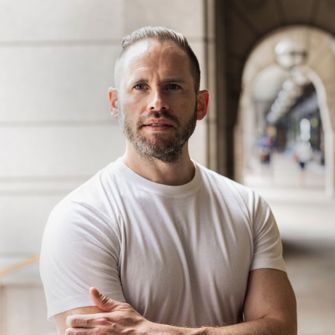An innovative culture allows a workplace to grow and thrive, and also aligns with the needs of the organisation and with the people it serves. It’s at the heart of the developing innovation strategy here at Crisis, which is why it was my delight to introduce two powerhouses of innovation at our Entrepreneurship Forum on 06 October.
From our corporate partner Sky, we met Tim Hole, an innovation coach and a beaming joy to have streamed into the office and our homes. With experience from years of work with exciting names at Universal, Warner Bros, and Google, Tim shared some really fascinating stories from his current workplace. 
For me, most interesting was his talk of the Brain Trust. This is an internal function at Sky where people from across the whole organisation meet to tackle problems delivered to Tim from senior leadership. This 360-degree input from the organisation means that problems can be solved holistically and in ways that work for everyone. They meet on Miro, a virtual whiteboarding tool, and map out methods of solving challenges. This diverse intelligence draws on a psychological heuristic, the ‘wisdom of crowds’. To make sure that folks really get talking, Tim talked about the importance of meaningful icebreakers, giving participants the space to feel comfortable and be open and honest when thinking about solving the issues.
He closed with a great insight into his passion for sustainability. He said innovation is at its best when it produces ‘nothing’ - no carbon footprint or wastage. Is that something for us to think about as an organisation as we face looming issues around climate change? How can we create new products and services without any physical production/waste?
 Next up was Emma Lancia, Head of Culture within Commercial Technology from our corporate partner PWC. Her discussion was on the need for innovation within organisations as a way to strengthen the core of a business. This not only helps with the organisational development but also gives employees an opportunity to step outside of their day jobs and experience different work which can be more meaningful, such as working with vulnerable populations such as in prisons.
Next up was Emma Lancia, Head of Culture within Commercial Technology from our corporate partner PWC. Her discussion was on the need for innovation within organisations as a way to strengthen the core of a business. This not only helps with the organisational development but also gives employees an opportunity to step outside of their day jobs and experience different work which can be more meaningful, such as working with vulnerable populations such as in prisons.
She discussed the importance of training in innovation for the whole organisation. This helps to develop awareness of innovation, gives people an understanding of best practice in problem exploration and helps them to apply insights in their own work. Success stories should be shared widely to get people interested and further raise awareness.
We all discussed the importance in identifying what good looks like, what bad looks like and the importance of tracking milestones in innovation, whether quick insights work or long-term projects which might not have financial or impact metrics for a couple of years.
The session was well attended and hugely enjoyable. Are there learnings we can draw from these chats on how we build innovation into our DMA at Crisis? How could we use the Brain Trust model to tackle challenges and threats across the organisation?
A huge thanks to Tim and Emma for giving us their time, sharing their expertise and invigorating our Wednesday afternoon!
Jem Henderson recently started as Head of Innovation at Crisis, and is contactable at jem.henderson@crisis.org.uk. If you think your business can support Crisis to end homelessness, get in touch at corporatepartnerships@crisis.org.uk to explore opportunities for working together.
